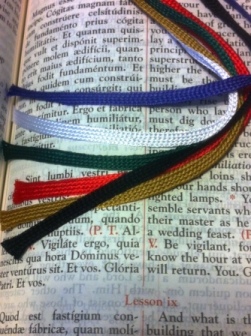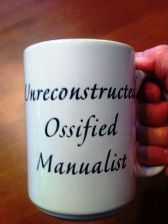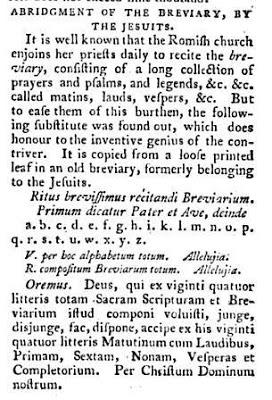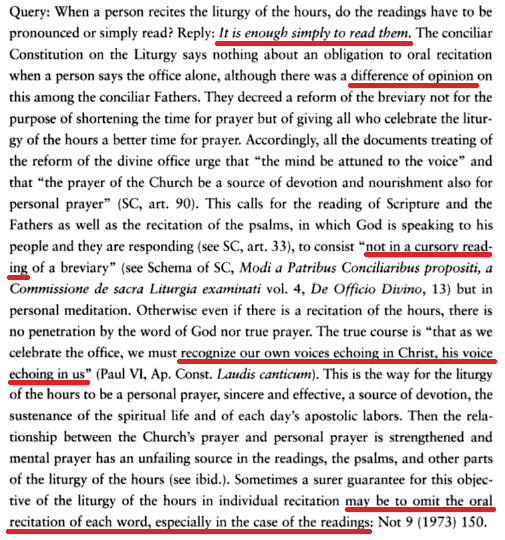From a reader…
QUAERITUR:
I was recently reading Quigley’s “The Divine Office: A Study of the Roman Breviary.” In it he mentions that vocal recitation was necessary to validly fulfill the obligation of reciting the office. Does this still hold for the Liturgy of the Hours? For example, is one who is bound to say the office bound to vocally recite, for example, the lessons at the office of readings?
I did a lengthy look on this question here on the blog. The “search box” is useful, btw. That’s how I found what I wrote a couple years back.
Here it is:
Published on: Aug 28, 2017
 From a reader…
From a reader…
QUAERITUR:
I have seen a tendency for people who have a duty to say the Office attempt to satisfy their obligation without mouthing the words with air passing through the lips. Has the liturgical law changed? I’m pressure sure [I’m pretty sure that that’s “pretty sure”] the older manuals like Prummer [insert reverent head bow here] said each syllable must be uttered for the perfect satisfaction of the obligation.
So the question is must the Office be performed as vocal prayer rather than interior mental prayer?
For the perfect satisfaction of the obligation?
 We are Unreconstructed Ossified Manualists. Let’s look it up.
We are Unreconstructed Ossified Manualists. Let’s look it up.
Let me just say that most diocesan priests and bishops – 99.99% I would guess – might be a little horrified to read the whole section De attentione et devotione in recitandis Horis in…
Sabbetti-Barrett (see my note at the very end of the post):
Pronuntiatio debet esse vocalis, integra et continuata. Et 1°. quidem debet esse vocalis, nam Officum recitari debet voce, et quidem distincta; non autem sufficit, ut sola mente legatur, aut tantum oculis percurratur; nec satis est, se recitetur gutture vel intra dentes, aut syncopando, linguave titubante abbreviando; nam id quod praecipitur est oratio propriae vocalis; oratio autem non censetur proprie vocalis, nisi voce distincta fiat;2°. debet esse integra, ad integritatem autem pertinent Pater, Ave Credo in principio et fine Horarum, prout in Rubricis adnotatur, non autem orationes Aperi Domine et Sacrosanctae, quae solum ex consilio recitantur; 3°. debet esse continuata; se proinde quaecumque notabilis interruptio intra unam Horam, si absque ulla causa fiat, culpa non caret; sed peccatum veniale non excidit. Cf. S. Alphons. n. 166.
So, yes, the Office must be recited, pronounced, since it is vocal prayer (cf. CCC 2700 ff.).
Also,
580 QUAER. 1°. An recitans Officium debeat se audire, ut possit dici vocaliter orare?
Resp. Neg., quia oratio vocalis dicitur per oppositionem ad mentalem, et vere habetur quoties verba vere pronuntiantur, utut a nemine audiantur; ac proinde sufficit, si recitans conscius sibi sit se verba pronuntiare. – Cf. S. Alphons. n. 163.
Deeply drilling Prümmer (1953) says (vol. 2, #370): “Ad plene satisfaciendum praecepto ecclesiastico Officium divinum recitari debet: 1. debito ordine, loco, situ, tempore; 2. integre; 3. continue; 4. vocaliter; 5. cum attentione et intentione.”
Notice that “plene“!
In the explanation in #375 he says:
“Immo est consuetudo haud laudabilis ita proferendi aut potius sibilandi verba Officii in recitatione privata, ut circumstantes inde molestiam patiantur. Clericus mentaliter tantum Officium legens aut solis oculis percurrens non satisfacit suae obligationi; saltem si non habet speciale privilegium.”
If you don’t say your Office vocally, and just do it mentally, according to Prümmer you don’t fulfill your obligation. HOWEVER, he goes on to say that Leo X (of happy memory) gave the Friars Minor this privilege. And also in #376,
“Propter auctoritatem S. Alphonsi, cuius sententias quilibet confessarius in praxi sequi potest, nisi Curia Romana expresse aliud statuerit, non auderem quidem peccati mortalis reum declarare clericum regularem, qui totum Officium mentaliter tantum dixerit, sed haud pauci auctores docent, privilegium istud a Leone X concessum hodie iam non existere.”
Something in the back of my mind tells me that that privilege was rescinded by Gregory V.
HENCE: Recitation of the Office should be aloud, since it is official and mainly vocal prayer. This is why of yore and even now priests move their lips when saying their Office.
I guess it could be possible to fulfill your obligation mentally, but only with permission from proper authority. I imagine that that could be the diocesan bishop for diocesan priests. After all, Sacrosanctum Concilium 101 says that the “ordinary” can give clerics permission to use the vernacular for the office. More HERE. One might argue that while Latin may not be of the essence of the Office, vocal prayer is.
However, even when you don’t read aloud, there is a measure of subvocalization going on when reading.
That said, I am of the opinion that a priest imperfectly fulfills his obligation even when not moving his lips, only reading silently. I don’t know if that is a venial sin or not. I suppose a great deal depends on the training the priest had about the nature of the Office. I suspect that none of this is explained in seminaries, even from the point of view of historical interest.
In the instruction for the Liturgy of the Hours there is an explanation that biographical notes about saints are not for reading aloud. That implies that the rest is read aloud. Also, there is a paragraph at 103 says that “even when a psalm is recited and not sung or is said silently in private, its musical character should govern its use”. But that seems to be about Psalms in general rather in about their specific recitation in the Office.
It seems to be that even in the lax days of the Liturgy of the Hours, the obligation of true vocal recitation remains as it did before.
 If that is the case, we are in serious trouble as a Church and so is the whole world: the official prayer of the Church which clerics and religious should be offering for the sake of the whole People of God … isn’t being offered in a satisfactory way.
If that is the case, we are in serious trouble as a Church and so is the whole world: the official prayer of the Church which clerics and religious should be offering for the sake of the whole People of God … isn’t being offered in a satisfactory way.
See my SAVE THE LITURGY – SAVE THE WORLD Manifesto.
And then there’s this!

When I read these manuals, especially the sections that pertain to clerical life, liturgy, etc., I am always left simultaneously edified and humiliated.
I am edified at the amazing ideals which are proposed according to law and reason.
I am humiliated in that in many respects I don’t come up to scratch.
I must rededicate myself – confess those faults which I think may be mortal – and then amend and improve.
So… I am now going to back away from this question and quietly, indeed silently and not even moving my lips, go back to my To Do List.
The moderation queue is ON (especially for those who want to provide translations of the Latin – which would be a great service to non-Latin reading bishops and priests out there). If sound, I’ll integrate them into the post.
UPDATE: Not satisfied… I found also this.
Sacred Congregation for Divine Worship Note Liturgiae Horarum Interpretationes (Not 9 (1973) 150)
Query: When a person recites the liturgy of the hours do the readings have to be pronounced or simply read?
Reply: It is enough to simply read them. The conciliar Constitution on the Liturgy says nothing about an obligation to oral recitation when a person says the office alone, although there was a difference of opinion on this among the conciliar Fathers. They decreed a reform of the breviary not for the purpose of shortening the time of prayer but of giving all who celebrate the liturgy of the hours a better time for prayer…Sometimes a surer guarantee for this objective of the liturgy of the hours in individual recitation may be to omit the oral recitation of each word, especially in the case of the readings.
Found on page 1098 of Documents on the Liturgy 1963-1979. Conciliar, Papal and Curial Texts. The Liturgical Press, 1982
With this explanation:

I find in this a contradiction, especially in light of the expression of Paul VI about Christ’s voice echoing in us.
This is such a different approach. It seems simply to sweep aside the characteristic liturgical prayer as vocal prayer. NB: A priest cannot simply think the words of consecration or the forms of the other sacraments.


































Highly recommend the ibreviary app to this end, also available on a browser http://www.ibreviary.com/m/breviario.php
It has a “Latinum” translation setting where I can vocally prayer the psalms in Latin, & every weekend we (KofC, etc) prayer them aloud virtually together.
In an online discussion elsewhere, someone brought up a question that seems like a fair tangent to discuss, as it also is about liceity when praying the Liturgy of the Hours. The context was the release of a new printing of the Divine Office for the Anglican ordinariates.
Noting that the description said it included the hour of Prime, the question came up that Sacrosanctum Concilium ordered, “The hour of Prime is to be suppressed,” so is an indult needed for this?
My first thought was that if it is only prayed in private, how could an indult be needed?
For the matter of public prayer, I started from the example of the Leonine prayers, also suppressed after Vatican II, but regaining popularity lately. First of all, it was clear that none of the individual prayers of the Leonine practice were suppressed, although that is not a complete answer. Secondly, and I found this view supported by liturgist Father Edward NcNamara, praying the Leonine prayers was not being mandated, and it was not being inserted inappropriately into the liturgy as long as they were said after the conclusion of Mass. Therefore it is not illicit to pray them voluntarily.
I would think the same logic could be applied to praying the Prime.
Lastly, I had a hunch that perhaps I was making it too complicated, and maybe an indult was already granted, so I looked up Anglicanorum Coetibus, and was not the least bit surprised to find Pope Benedict XVI was years ahead of me:
That tradition includes the Prime. Case closed.
Is it permissible for lay people to pray the Roman Breviary instead of the Liturgy of the Hours? Or priests for that matter?
Of course! You can use these methods of prayer. You have no obligation to, but if you choose to you can do what you want to with them.
Have at!
Being in formation currently, one of our first classes was on the Liturgy of the Hours and praying Morning and Evening Prayer as a deacon. A couple things not mentioned in the training:
1. We were not told about verbal recitation when alone. I tried it today and found it very edifying – I actually “prayed” the Morning Prayer and not just recited it in my mind.
2. I was told just this past formation year (in Year 2 of formation) that the Invitatory is not needed to be recited by Deacons since we just do Morning and Evening Prayer. Even told that was what the bishop said as well…. The rubrics would indicate the opposite. I continue to do the Invitatory each morning before I start my Morning Prayer. I feel that I owe God that in the Liturgy and I believe it is proper. Also going above and beyond in the prayer life has to be a good thing.
It seems to me from my limited vantage in formation that the watering down of liturgy indeed happens in other areas besides the Mass. This is one such example. Read the Red and say the Black – the rubrics, if you follow them will not lead you astray.
I once heard it remarked (probably some post on NLM) that the reform of the Divine Office brought it from a prayer best suited to be sung in choir by the clergy, to one best suited to be read alone by the laity. Waiving the requirement to vocalize the prayers & readings would certainly be in keeping with that trend.
For me personally, I take advantage of that concession, because I can’t internalize, mentally, anything I recite out loud. (Without going into unnecessary detail, I’m not a neurotypical.) When I say any prayer or reading out loud, it pretty much goes straight from my eyes to my lips and bypasses my brain; I can’t recall much of what I just said out loud much less meditate on it. The conciliar concern about “no penetration of the word of God nor true prayer” definitely doesn’t apply to a lot of people, but it does apply to some, for whom the vocal and the interior are just mutually exclusive. So actually I pray the Office with this post-conciliar silent reading option for the very same reason that I prefer to participate in the traditional Mass: I opt for what is more conducive for true prayer and interiority. I would never say that’s for everyone, but I am grateful that such options are permissible, even for people who have an obligation to pray part of the daily Office.
“If you don’t say it, then you don’t pray it.”
Let’s state something that may seem obvious, but perhaps is not:
If you do not have the obligation of offering the Divine Office, then you are free to make use of the Divine Office as you wish.
By that I mean: you are free to pray it silently or aloud. You are free to pray any part of it, you do not have to complete any hour, or do the entire day’s worth of hours. You do not have to pray any hour at any particular time or on any particular day, because then you are making this prayer your own private, devotional prayer.
Of course, if you want join in the public, corporate expression of the Divine Office, then by all means, pray the approved texts in the usual way, on the assigned days and times. You may not be physically present with others praying the same hour of the Office, but you are praying with them nonetheless. But I think those who have no *obligation* should view this as an opportunity, and if they forget, or get interrupted, or oversleep or what-have-you, you have no reason to feel guilty.
Interesting! I spent five years in religious life and never once heard this, and, of course, as a religious, I was bound to pray the Office. But it was never mentioned in formation. Whenever we had a rare “bishop day”, i.e. a day when the bishop dispensed us from praying the office together in chapel, not one of the sisters ever prayed the Office out loud or even mouthing the words. But the idea of praying it aloud makes sense.
@HenryEdwards: I’m not sure if you mean this just about the Office or if you mean it about prayer in general, but if you mean it in general, I think that’s a little simplistic and narrow when it comes to prayer. There’s the whole realm of mental and contemplative prayer when one is saying nothing and yet very much actually praying–and often more profoundly so than when reciting vocal prayer.
Cafea Fruor – That aphorism is simply a dictum quoted from an old howto manual on the Divine Office.
@Henry Edwards
What version of the Office are you praying these days, brother?
DivineOffice.org has recently reopened its website to users in the USA. They use the approved English texts that appear in the printed editions of the Divine Office. They only have licensing for use in the USA.
*
https://divineoffice.org/
Pingback: MONDAY EDITION – Big Pulpit